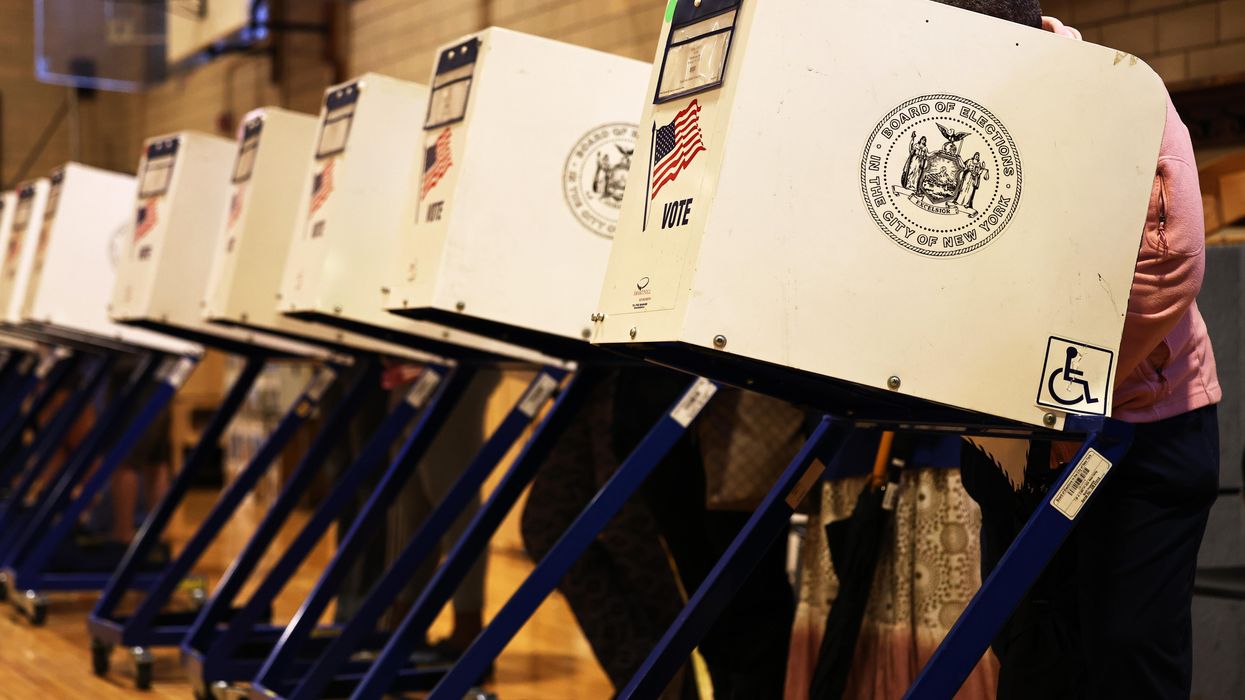A tallying error by the New York City Board of Elections threw the otherwise smoothly run ranked-choice voting primary into disarray on Tuesday.
The Board of Elections accidentally included 135,000 test ballots in its unofficial vote tally, but has not yet counted the more than 124,000 absentee ballots. The erroneous results showed Kathryn Garcia within reach of overtaking Eric Adams' lead, but now the actual standings in the Democratic mayoral primary are unclear.
Despite this mishap, voting reform advocates are celebrating a successful first attempt at citywide use of ranked-choice voting in the country's most populous metropolis. They hope positive reviews in New York will encourage adoption of the alternative voting method in other parts of the country.
Earlier this month, New York City voters ranked in order of preference up to five candidates for mayor, comptroller, borough president, city council and public advocate. Now, those votes are being processed and tabulated, with final results expected in mid-July.
In the case that no candidate receives majority support, an election will go into an instant runoff in which the candidate with the fewest votes is eliminated and that person's support is redistributed to voters' second choices. This continues until one candidate crosses the 50 percent threshold.
Initial exit polling shows voters turned out in large numbers and had an easy transition to RCV. More than 1.1 million New Yorkers cast ballots in the municipal primary, the highest turnout in more than three decades, according to Common Cause New York and Rank the Vote NYC. The two organizations conducted exit polling, released Monday, with Edison Research to determine how voters adjusted to the new voting method.
An overwhelming majority of New Yorkers (95 percent) reported in the exit poll that they found ranked-choice voting easy to use. More than three-quarters also said they understood the alternative voting method "extremely or very well." And 77 percent said they want to use RCV in future elections.
The exit polling found that 83 percent of voters ranked at least two mayoral candidates on their ballots and 72 percent ranked three or more. Less than half of all voters (42 percent) used all five available rankings. Those who did not rank multiple candidates said it was because they had only one preference.
The top three reasons, according to the poll, voters chose to rank multiple candidates were:
- It allowed them to vote their values.
- It allowed them to support multiple candidates.
- It gave them more of a say in who gets elected.
The survey of 1,662 Democratic voters in New York City was conducted by phone and in person June 12-22. The in-person interviews, offered in both English and Spanish, were conducted at dozens of early and election day voting centers across the city. Absentee exit polling is currently being conducted and will be released in mid-July.
"The largest ranked choice voting election in United States history was a major victory for New York voters who found it easy and empowering," Susan Lerner, executive director of Common Cause New York and chair of Rank the Vote NYC, said in a statement. "The data also confirm that our years-long outreach and education efforts paid off brilliantly."
Rank the Vote NYC partnered with more than 700 organizations in the city to conduct hundreds of trainings for campaigns and voters. The group also distributed informational resources about ranked-choice voting, knocked on doors to engage with voters and stationed volunteers at polling sites to answer questions about RCV.
Despite the successful campaigns by reform groups, the Board of Elections' problematic vote tally Tuesday night cast doubton the accuracy of the election results. Advocates maintain that the board, which has a history of election blunders, is to blame, not the new voting system.
"We are not at all happy that it happened, but it was a mistake that the BOE is moving to correct," Lerner said in a statement. "The long time opponents of RCV seizing this moment to attack a more democratic system of elections — that exit polling shows voters overwhelmingly support — are misguided and misleading the public. We remain focused on moving forward to ensure the responsible and reliable results New Yorkers demand."
Much of the focus in the New York City elections has been on the Democratic primary for mayor. With 13 candidates on the ballot, pro-RCV advocates say giving voters the opportunity to rank their top picks ensures no one's vote is wasted. Whichever Democrat wins will face Curtis Sliwa, who won the Republican primary, in the November general election.
Ranked-choice voting also played an important role in the city council races. All 51 seats were up for election, and 35 of the races lacked an incumbent. Having so many open races was a "boon for women and candidates of color," said Cynthia Richie Terrell, founder and executive director of RepresentWomen.
Throughout much of history, women and people of color who want to run for office have been told to "wait their turn," Terrell said, because they might "split the vote."
"In a ranked-choice voting election, you can have multiple women running and not split the vote," she said, offering one reason New York City has seen so many more women and people of color run in this year's elections.
The preliminary results show women leading in 29 of the council races, meaning for the first time in New York City's history the council could have majority female representation.
Outside of New York City, ranked-choice voting is gaining momentum in other parts of the country. The alternative voting method was recently used in the Virginia Republican Party's nominating contest for governor, lieutenant governor and attorney general. And this year almost two dozen cities in Utah have also opted to switch to ranked-choice voting for mayoral and city council races.





















